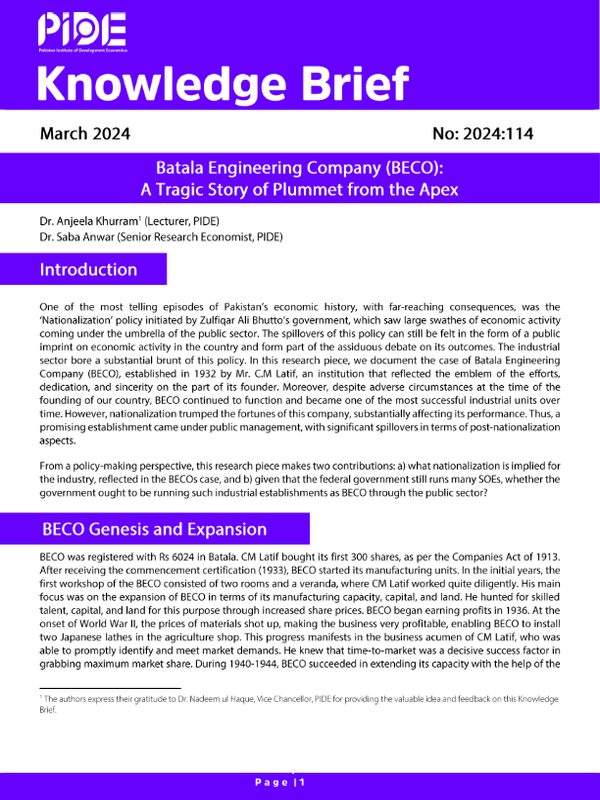Batala Engineering Company (BECO): A Tragic Story of Plummet from the Apex
One of the most telling episodes of Pakistan’s economic history, with far-reaching consequences, was the ‘Nationalization’ policy initiated by Zulfiqar Ali Bhutto’s government, which saw large swathes of economic activity coming under the umbrella of the public sector. The spillovers of this policy can still be felt in the form of a public imprint on economic activity in the country and form part of the assiduous debate on its outcomes. The industrial sector bore a substantial brunt of this policy. In this research piece, we document the case of Batala Engineering Company (BECO), established in 1932 by Mr. C.M Latif, an institution that reflected the emblem of the efforts, dedication, and sincerity on the part of its founder. Moreover, despite adverse circumstances at the time of the founding of our country, BECO continued to function and became one of the most successful industrial units over time. However, nationalization trumped the fortunes of this company, substantially affecting its performance. Thus, a promising establishment came under public management, with significant spillovers in terms of post-nationalization aspects.
From a policy-making perspective, this research piece makes two contributions: a) what nationalization is implied for the industry, reflected in the BECOs case, and b) given that the federal government still runs many SOEs, whether the government ought to be running such industrial establishments as BECO through the public sector?
BECO Genesis and Expansion
BECO was registered with Rs 6024 in Batala. CM Latif bought its first 300 shares, as per the Companies Act of 1913. After receiving the commencement certification (1933), BECO started its manufacturing units. In the initial years, the first workshop of the BECO consisted of two rooms and a veranda, where CM Latif worked quite diligently. His main focus was on the expansion of BECO in terms of its manufacturing capacity, capital, and land. He hunted for skilled talent, capital, and land for this purpose through increased share prices. BECO began earning profits in 1936. At the onset of World War II, the prices of materials shot up, making the business very profitable, enabling BECO to install two Japanese lathes in the agriculture shop. This progress manifests in the business acumen of CM Latif, who was able to promptly identify and meet market demands. He knew that time-to-market was a decisive success factor in grabbing maximum market share. During 1940-1944, BECO succeeded in extending its capacity with the help of the lease offered by the government. BECO also opened a branch office to represent BECO in Lahore. This was when CM Latif’s foreign visits to major European countries won him international recognition. Believing the importance of knowledge transfer, he hired two German Engineers for BECO (1947) to capitalize on their expertise. During partition (1947), BECO was one of the largest three machine tool manufacturers in the subcontinent.




